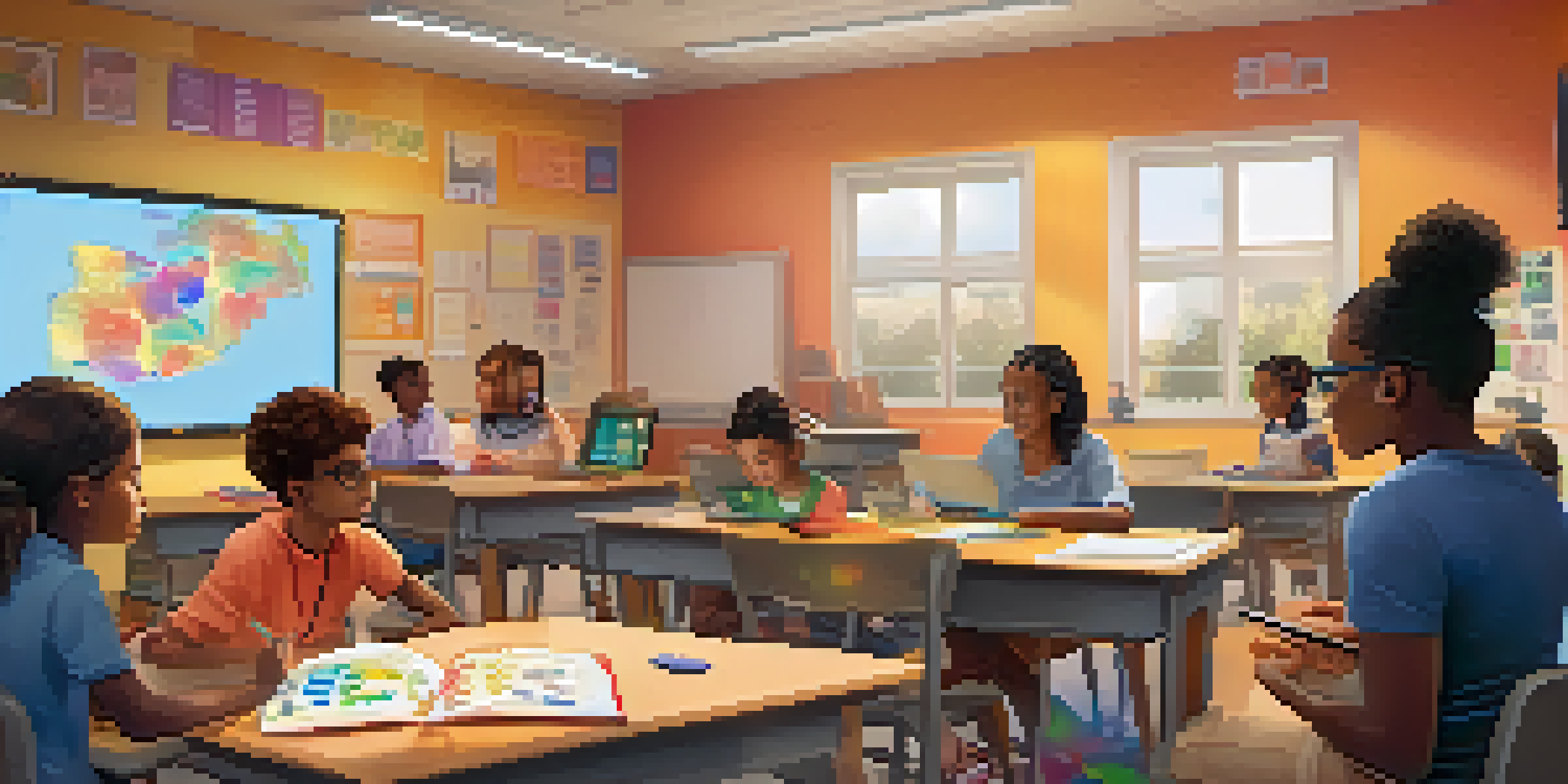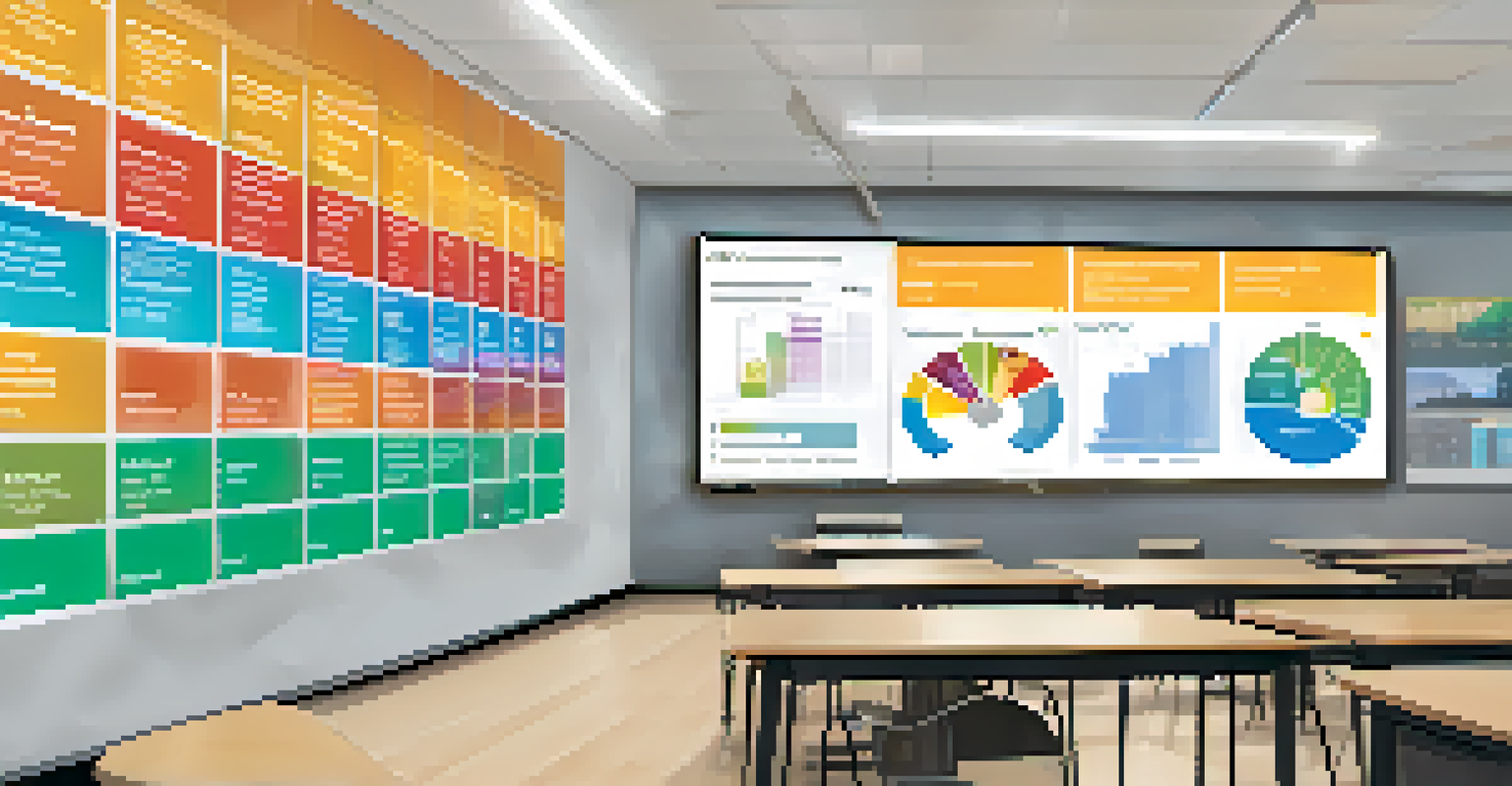Evaluating Student Outcomes with Adaptive Learning Technologies

Understanding Adaptive Learning Technologies in Education
Adaptive learning technologies are innovative tools designed to personalize the educational experience for each student. These systems analyze individual performance and learning styles, adjusting content delivery to fit unique needs. Imagine having a tutor who knows exactly what you struggle with and guides you accordingly—that's the essence of adaptive learning.
Personalized learning is not just a trend; it represents a fundamental shift in how we think about education.
By leveraging data analytics and artificial intelligence, these technologies provide real-time feedback and tailored learning paths. This means students can progress at their own pace, ensuring they grasp concepts before moving on. The flexibility offered by adaptive learning creates a more engaging and effective educational environment.
As educators increasingly adopt these technologies, understanding their impact on student outcomes becomes crucial. It’s not just about delivering content; it's about fostering a learning journey that resonates with each student. This shift towards personalization can lead to improved academic performance and deeper understanding.
Key Features of Adaptive Learning Technologies
One of the standout features of adaptive learning technologies is their ability to assess a student's knowledge in real-time. By utilizing quizzes, interactive activities, and data tracking, these tools can quickly identify areas where a student excels or struggles. This immediate feedback loop enables educators to intervene when necessary, fostering a proactive learning atmosphere.

Another key feature is the personalized content adaptation based on each student's progress. For instance, if a student masters a topic quickly, the system can introduce more challenging material sooner. Conversely, if a student needs more time, the platform can offer additional resources or practice tasks to reinforce their understanding.
Personalized Learning Experience
Adaptive learning technologies tailor educational content to fit individual student needs, enhancing engagement and understanding.
Additionally, these technologies often include progress tracking dashboards for both students and educators. This transparency not only motivates students to take ownership of their learning but also allows teachers to tailor their instruction based on real-time data. The result? A more dynamic and responsive educational experience.
Benefits of Implementing Adaptive Learning Technologies
One of the primary benefits of adaptive learning technologies is enhanced student engagement. By providing a customized experience, students feel more connected to their learning process, which can lead to a greater desire to participate. This engagement is crucial, as motivated students are more likely to achieve positive academic outcomes.
The future of learning is about creating experiences that engage and inspire students to take charge of their own education.
Moreover, these technologies can significantly reduce learning gaps. By addressing individual needs and pacing, students who may struggle in traditional learning environments can catch up and even excel. This personalized approach helps to create a more equitable classroom, where every student has the opportunity to succeed.
Finally, adaptive learning technologies can foster a growth mindset among students. When learners see their progress through tailored feedback and achievable goals, they develop resilience and confidence. This shift in mindset not only benefits their immediate educational experience but also prepares them for lifelong learning.
Challenges in Evaluating Student Outcomes
While adaptive learning technologies offer numerous benefits, evaluating their impact on student outcomes can be challenging. One major hurdle is the variability in how different systems measure success. Depending on the platform, criteria for assessment may differ, making it difficult to draw consistent conclusions across various tools.
Another challenge lies in ensuring that the data collected is both reliable and comprehensive. In some cases, the metrics used might not fully capture a student’s growth or understanding. For instance, while test scores are one indicator, they don’t reflect a student's engagement or development of critical thinking skills.
Real-Time Feedback and Assessment
These systems provide immediate insights into student performance, allowing educators to intervene and adjust instruction effectively.
Additionally, educators must be trained to interpret the data correctly and use it effectively. Without proper understanding, valuable insights can be overlooked. Therefore, ongoing professional development is essential for teachers to maximize the potential of adaptive learning technologies.
Best Practices for Evaluating Adaptive Learning Outcomes
To effectively evaluate student outcomes in adaptive learning environments, it’s important to establish clear objectives. By defining what success looks like for each student, educators can better assess the effectiveness of the technology. Setting specific, measurable goals helps in tracking progress and identifying areas for improvement.
Incorporating a variety of assessment methods is another best practice. Instead of solely relying on standardized tests, educators should consider project-based assessments, peer evaluations, and self-assessments. This holistic approach provides a more rounded view of student performance and understanding.
Finally, feedback loops are essential for continuous improvement. Regularly gathering insights from both students and teachers regarding their experiences with the technology can inform necessary adjustments. This collaborative effort ensures that adaptive learning tools remain effective and relevant.
The Role of Educators in Adaptive Learning Environments
Educators play a pivotal role in the success of adaptive learning technologies. They are not just facilitators of content; they are crucial interpreters of the data generated by these systems. By understanding student needs and leveraging technology insights, teachers can tailor their instruction to maximize learning outcomes.
Moreover, educators must foster a classroom culture that embraces technology. This involves not only integrating tools into lessons but also encouraging students to engage with them actively. When students feel supported by their teachers in using adaptive technologies, they are more likely to embrace personalized learning paths.
Emphasis on Holistic Development
Future trends in adaptive learning will focus on integrating social-emotional learning to support overall student growth alongside academic success.
Lastly, ongoing communication between educators and technology developers can enhance the effectiveness of these systems. By sharing classroom experiences and insights, teachers can help refine tools to better meet educational needs. This partnership is vital for creating a seamless blend of education and technology.
Future Trends in Adaptive Learning Technologies
As technology continues to evolve, so too will adaptive learning systems. Future trends may include the integration of virtual reality (VR) and augmented reality (AR) to create immersive learning experiences. Imagine students exploring historical events or scientific concepts in a virtual environment tailored to their learning style—this could redefine engagement.
Another trend is the increasing use of machine learning algorithms to enhance personalization. As these systems analyze more data, they can become even more adept at predicting student needs and adapting content accordingly. This could lead to a more intuitive learning experience, where technology anticipates challenges before they arise.

Finally, the focus on social-emotional learning (SEL) will likely play a significant role in future adaptive technologies. By incorporating elements that nurture emotional intelligence and resilience, these systems can support not just academic success but also holistic student development. This shift towards a more comprehensive educational experience is an exciting frontier.